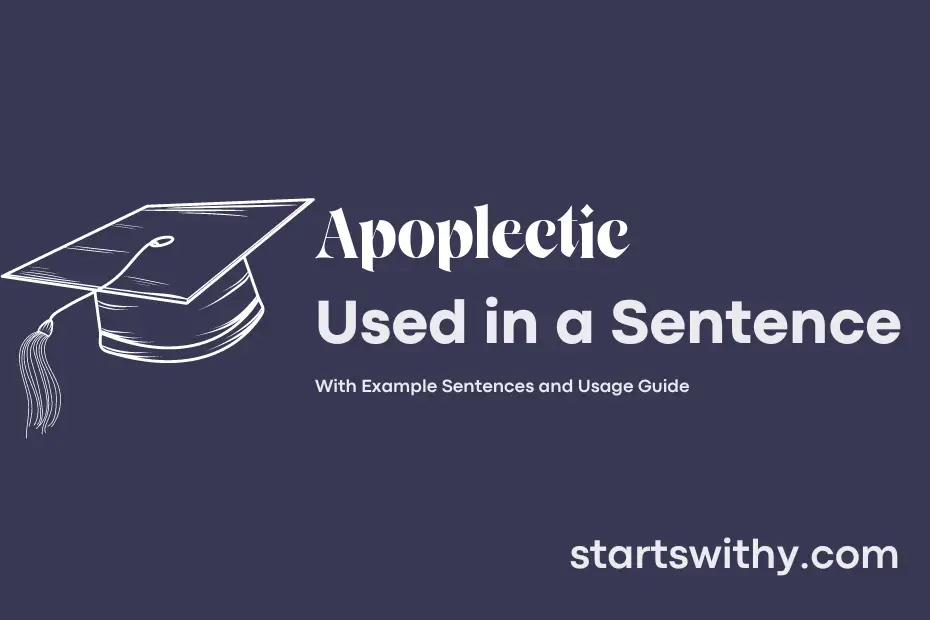Have you ever witnessed someone becoming so overcome with anger that they appeared on the verge of a stroke? This extreme and uncontrollable fit of rage can be described as apoplectic. Derived from the Greek word “apoplektikos,” meaning struck down by violence, apoplectic is a term often used to depict someone in a state of intense fury or indignation.
When someone becomes apoplectic, they may exhibit symptoms such as red-faced and shaking with rage, often struggling to contain their emotions. The term is commonly used to describe a person’s reaction to a situation that evokes extreme anger or outrage.
7 Examples Of Apoplectic Used In a Sentence For Kids
- The teacher was apoplectic when she saw crayon marks on the walls.
- Aunty was apoplectic when she couldn’t find her keys.
- The tiger looked apoplectic when it couldn’t catch the mouse.
- Grandma was apoplectic when she saw the broken vase.
- The conductor was apoplectic when the children made noise on the bus.
- The chef was apoplectic when he burnt the roti.
- The principal was apoplectic when the students made a mess in the classroom.
14 Sentences with Apoplectic Examples
- Apoplectic professors may be common during exam season when students ask questions about topics already covered in class.
- Submitting an incomplete assignment may lead to an apoplectic reaction from your professor.
- Your parents might be apoplectic if they find out you failed a course and didn’t inform them.
- Group projects can sometimes cause apoplectic arguments among team members with differing opinions.
- The college librarian was apoplectic when he saw students eating in the library and creating a mess.
- Getting caught cheating on an exam could result in an apoplectic response from the faculty.
- The student council president was apoplectic after discovering that the funds for the college event were mismanaged.
- An apoplectic student stormed out of the class after receiving a failing grade on their final paper.
- Professors can become apoplectic if they receive poorly written essays riddled with grammar mistakes.
- Canceling a highly anticipated college event at the last minute could leave students feeling apoplectic.
- An apoplectic reaction from your roommate might ensue if you constantly play loud music late at night.
- Failure to follow proper citation guidelines for your research paper could leave your professor feeling apoplectic.
- Trying to sneak into a restricted area of the college campus could trigger an apoplectic response from security.
- An apoplectic board of examiners may decide to cancel an entire examination due to a large number of cheating incidents.
How To Use Apoplectic in Sentences?
To use the word apoplectic in a sentence, identify a situation where someone is extremely angry or outraged beyond control. For example, “When he found out that his proposal had been rejected, he was apoplectic with rage.”
It is important to note that apoplectic is a strong word and is typically used to describe intense feelings of anger or fury. It is not commonly used in everyday conversations and is more appropriate in formal or dramatic contexts.
When using apoplectic in a sentence, it is crucial to consider the tone and severity of the emotion being conveyed. Make sure the situation warrants such strong language and that the intensity of the anger is accurately portrayed.
Remember that apoplectic is an adjective, so it is often used to describe a person’s emotional state or reaction. It is not a noun and should not be used to refer to a person directly.
In conclusion, when incorporating apoplectic into your writing or speech, choose your context carefully to ensure it is used appropriately. By following these guidelines, you can effectively communicate intense anger or outrage using this powerful word.
Conclusion
In conclusion, the sentences with the word “apoplectic” consistently demonstrated extreme anger or rage. Whether describing a boss’s furious reaction to a mistake or a politician’s outrage over an opposing view, the term effectively conveys a heightened state of emotional intensity. Through these sentences, it is clear that “apoplectic” is reserved for situations of intense anger that can border on uncontrollable or irrational reactions.
Overall, the examples highlighted the power and impact of the word “apoplectic” in conveying extreme emotional states. By using this term, writers can vividly depict scenes of anger or fury, adding depth and intensity to their descriptions.



